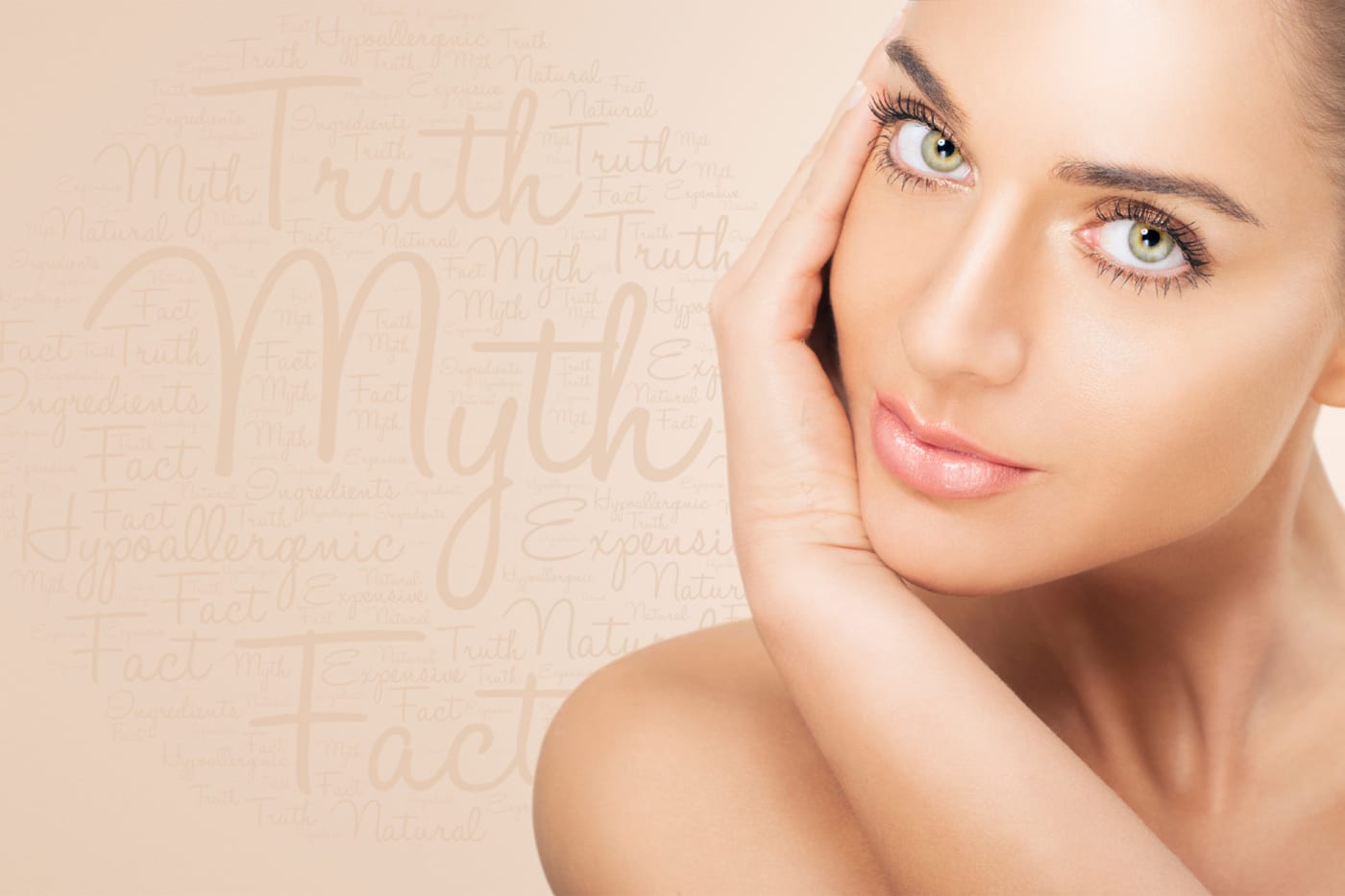Skin care myths are so internalized into our collective subconscious, that we might not realize they are sabotaging our routines. Especially these days when we consider skin care an integrative part of our self-esteem and even mental health.
Or at least, what Instagram calls mental health. “All I want for Christmas is clear skin”, “link in my bio for glass skin” or “skin check”, are the kind of posts that essentialize an immaculate complexion.
Social media and the influencer culture have prompted the rise of skin care routines as a form of self-care indulgence.
Not only that we constantly witness unrealistic, luster-like skin, but we are also led down a rabbit hole of false constructions and mythologies on “how to get doll skin”.
Skin texture and imperfections get submerged under the filter-centered currents and we are left with false recipes on how to attain perfection.
In the pursuit of a flawless complexion, we might catch ourselves trying to distinguish fact from fiction in the avalanche of unscientific tips and tricks. Below is our pick for the top skin care myths that you need to stop falling for right now.
Skin care myth: open/closed pores
There is at least one member of your family who taught you that your pores can open and close. Maybe you heard that you should not get outside after taking a hot bath because your pores are still open; or that steaming your face can open the pores and increase the effectiveness of facial creams.
Either way, any variation of that is simply false.
Pores do not have muscles that can make them move. It’s one of the most widespread skin care myths. They are canals that connect to your hair follicles and conduct sweat and sebum to the surface of the skin.
This is why you may find that your T-zone has a higher concentration of pores, due to increased oil production.
Pore size differs from person to person and there is no pore size that is abnormal. Of course, modern aesthetics argue against the appearance of large pores and encourages the purchase of “pore minimizing” creams.
Fact is, genetics and collagen deficiency can affect pore size, in which case, they become larger.
If collagen production is insufficient, the pores start to stretch-out. Genetics, sun exposure, old age and smoking, among other factors, are the principal drivers of low collagen production.
Similarly:
your pores may appear larger if they are congested. Oil, dirt, sweat and dead skin cells clog your pores and make them more visible.
As a solution, no amount of cold water would help with pore minimization. Instead, look after your collagen levels with the help of retinol serums and sun protection.
Furthermore, you want to cleanse correctly and start using AHA and BHA acids, which help with cell turnover and deep pore cleaning. Read our guide on CRES skincare system for a thorough and effective routine.
Oily skin doesn’t need moisturizer
It might sound counterintuitive to apply moisturizer to an already greasy surface. Truth is, confusing oily skin with hydrated skin is one of the biggest skin care myths.
The oily layer of your skin is called sebum and is secreted by the sebaceous glands to protect the skin barrier. Hydrated skin is the skin that absorbs enough water to maintain its elasticity, regenerative functions and radiance.
As the largest organ of the human body and the one that is most exposed to abrasive environmental conditions, it is important to maintain optimal moisture to attenuate dehydration.
Excessive oil production does not translate into excessive or optimal hydration levels. In fact, lack of hydration can be the very culprit in causing extremely oily skin, which ultimately can lead to acne and breakouts.
As a result, you then apply anti-acne products that dry up your skin and again promote loss of moisture. This creates a vicious cycle that can be avoided with the right moisturizer.
Incorporating a moisturizer in your daily skin care routine can gradually make your skin less oily, as it will help the sebum production compensate. For your oily skin, choose a light, oil-free and fast-absorbing formula for your moisturizer.
Skin care myth: topicals vs. injectables
If you’re religiously following an extensive skin care routine, we applaud you. But if you’re doing it with the expectation that you can treat certain skin imperfections, we’re booing you. Certain being the operative word here…skin care can only do so much for you.
When it comes to skin imperfections, such as blemishes or flakiness, you can use the products that you know your skin positively responds to. SPF creams, moisturizers, exfoliants, antioxidants, vitamins etc., are all extremely beneficial for you; they fortify the protective barrier, nourish and hydrate your skin.
However, the deepest they can activate is pore-deep. These products operate on the surface level of your skin and are concerned with the texture, color, elasticity and hydration of your skin. In turn, injectables penetrate under the skin and operate on a more structural level.
Although there is no shortage of 50+ years old celebrities who claim that their skin is so tight and vibrant because they have satin pillowcases and drink green tea, that is simply not true.
Skin care myths prosper in misinformation.
An injectable such as Botox, for instance, intervenes in the nerve-muscle communication and pulls up underlying facial muscles. It adds volume to unwanted crevices, lifts droopy corners and balances out the overall facial symmetry.
While topicals can’t penetrate and manipulate the skin at this level, our recommendation is to use topicals and injectables concurrently for instant, as well as cumulative effects.
Sunscreen is a summer exclusive
This is possibly one of the skin care myths with the riskiest potential outcomes. If you consider yourself a skin care connoisseur who ticks all the boxes in terms of vitamins and serums but skip sunscreen, we have news for you.
Sunscreen is fundamental to your skin all year round, being more than a summer essential Why? Because its job is not to regulate your skin’s response to high temperatures, that’s what your sweat glands are for. Instead, sunscreen protects your skin against the ultraviolet (UV) light (photons) that the sun emanates constantly.
This UV radiation is what causes premature aging and skin cancer.
Indifferent of the season or weather, 80% of the sun’s UV rays would still reach the earth and damage the skin even on a snowy day. UVB photons make the molecules in your skin more reactive.
As a result, cumulative exposure can cause brown spots, age spots, hyperpigmentation, burns or cancerous cells. Similarly, UVA photons are just as damaging, only they operate on a deeper level, damaging elastin and collagen levels in your skin.
Come rain or shine, your skin needs a minimum protective factor of 30, indifferent of your skin type or tone. Remember to reapply every two hours and don’t neglect your neck, ears, chest and ears.
The myth of hypoallergenic products
The skin care products that are labelled “Hypoallergenic” are meant for use of sensitive skin – says every commercially-centered brand ever. The reality is that the word “Hypoallergenic” has no scientific meaning and implication!
Certain skin care brands often advertise and label “hypoallergenic” on their products, which according to the manufacturers, signifies that the product is mild, optimal for sensitive skin and is less likely to cause any allergic reaction.
But the fact of the matter is that there are no methods, ingredients, restrictions, regulations and testing to prove anywhere in the world if the product is hypoallergenic or not. Its meaning has the sole purpose of contriving the consumers into buying their products.
Whenever the products claim they are dermatologically tested, it does not imply that dermatologists accept or recommend that certain product.
Testing is oftentimes limited to a group of people that does not entirely reflect the population at which the product is directed towards.
You should pay more for better results
Are you really buying that high priced products have higher-quality ingredients while inexpensive products have lower quality ingredients?
We aren’t. All cosmetic companies use almost the same kind of cosmetic grade ingredients.
Cosmetic companies have no way of demonstrating that the ingredients they are using are of high quality.
BECAUSE:
The cosmetic ingredient manufacturing companies supply almost the same grades of cosmetic ingredients to various cosmetic product manufacturers. If they all pass the legal approval and quality checks, how can the acclaimed ‘high quality ingredients’ be better than others making the same product, but cheaper?
It has more to do with the marketing rather than its ingredient quality. Consumers feel the urge to buy more expensive, branded and exclusive products because they want to feel safe around products applied directly on their faces.
Brands take advantage of this need and create a “reliability” illusion by charging more for their products.
The “secret” ingredient
Oftentimes we see advertisements of a product having a unique formula created by a famous dermatologist, containing some secret ingredients that are now available for public use.
Naturally, skin care myths are always accompanied by “secrecy”.
The reality is that there is no secret formula or ingredient, nor any ancient and wonderous ingredient that has been secretly used by the world’s royals and oligarchs. Cosmetics have standard cosmetic ingredients that undergo a complex process of research and medical approval.
Cosmetic brands are masters at making their products sound like some mythical fountain of youth. Their overly-priced moisturizer is going to perform miracles for your skin – IF you subscribe to their website.
But in reality, whatever skin care products they create, they all have standard cosmetic ingredients approved by a scientific authority before being commercialized.
They are not allowed to contain any ingredient like that has undergone limited testing or has causes adverse reactions.
Any product of such kind has to follow stricter regulations. Even the highly acclaimed ingredients like seaweed extracts and plants oils cost pennies for the cosmetic companies and hundreds for the consumers (we’re looking at you, La Mer).
Organic vs. synthetic
Undoubtedly you have read how a certain brand’s skin care products make use of natural, organic ingredients.
This is a suggested opposition with synthetic ingredients derived from gasoline or petroleum based products that are presumably bad for your skin.
What you should know is that even the synthetic ingredients used in skin care products are derived from natural ingredients and environment.
So what’s unnatural in them? There are no cosmetics to date which use ‘all natural ingredients’.
Every product uses one or some other variety of synthetic ingredients in its composition. There are numerous synthetic ingredients which are great for your skin.
Petroleum and mineral oil by-products are derived from the natural resources and are absolutely organic in nature.
This skin care myth has no scientific evidence to support that the use of synthetic ingredients is harmful to the skin. In fact, global cosmetic authorities recognize them as superior emollients and considerably harmless.
As a result, it is absolutely safe and recommended to have any such ingredient in your skin care regime, especially if you have dry or sensitive skin.
Takeaway on skin care myths
Our skin is a revelatory surface that reflects our habits: how much we hydrate, if we sleep enough stress excessively, if we apply sunscreen or moisturize. It has become a central part of our self-perception and of how we expect others to perceive us.
We should already know by now that “flawless” doll skin is unrealistic and unachievable in the long term.
However, there are impactful ways in which you can anticipate the effects of any damaging habits. It’s important to know how to distinguish between what’s trending and what does your skin need and how to achieve that.
Be it the overnight results that a certain night mask promises, or an overly expensive eye cream, skin care myths exist and are perpetuated by brands that rely on misinformation.
It is therefore your responsibility to research, consult and document yourself on your personal skin care needs.
Read more on our dedicated blog and schedule a consultation with us today, so your future, 50 years old self can thank you tomorrow.


















Useful post about skin care mistakes, It’s best to learn from other’s mistakes than to feel the urge to commit one by oneself & then think of learning. I think we’ve all made some of these mistakes to some degree or another.